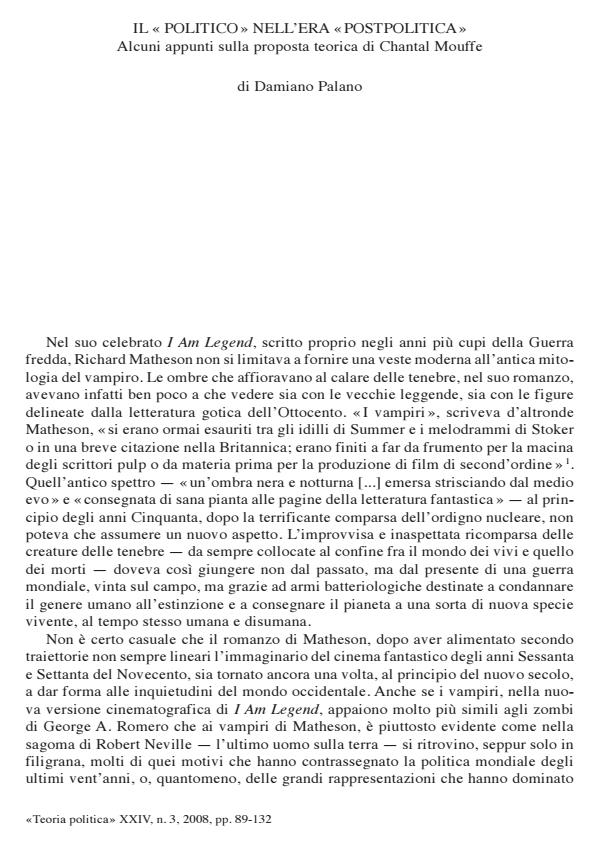Il "politico" nell'era "postpolitica". Alcuni appunti sulla proposta teorica di Chantal Mouffe
Journal title TEORIA POLITICA
Author/s Damiano Palano
Publishing Year 2009 Issue 2008/3
Language Italian Pages 44 P. 89-132 File size 336 KB
DOI 10.3280/TP2008-003004
DOI is like a bar code for intellectual property: to have more infomation
click here
Below, you can see the article first page
If you want to buy this article in PDF format, you can do it, following the instructions to buy download credits

FrancoAngeli is member of Publishers International Linking Association, Inc (PILA), a not-for-profit association which run the CrossRef service enabling links to and from online scholarly content.
The "Politica" in the "Postpolitical Age". Some Notes on the Theoretical Perspective of Chantal Mouffe - This essay concerns the reflection of Chantal Mouffe about the "politica" and the transformation of contemporary political systems. The paper reconstructs the main features of Mouffe's reflection, with special regard to the influence of Carl Schmitt and the concept of "agonistic democracy". For Mouffe, the friend/enemy opposition is the (not eliminable) hearth of the "politica", but this opposition is not the only form of antagonism. From Mouffe's point of view, "agoism" is a different mode of manifestation of antagonism, which involves a relation not between enemies but between "adversares", "friendly enemies" friends because they share a common symbolic space but also enemies because they want to organize this common symbolic space in a different way. The "postpolitica" age removes the enemy (even the "friendly enemy") from the symbolic space of western democracy, and enemy is represented as hostis generis humani. For this paper, Mouffe's perspective offers an important contribution to contemporary political debate, but the study shows a danger in her interpretation of Schmitt's political theory. For the German thinker, the amicus/hostis opposition is rooted in a spatial conception of the "politica", but Mouffe fails to consider this crucial aspect of Schmitt's reflection, with consequences on the image of the "postpoliticalage". In fact, without a spatial ground and without attention to the contemporary "spatial revoluton", she achieves a form of theoretical "voluntarsm" and moves toward a moralistic vision of the moralization of politics.
Damiano Palano, Il "politico" nell'era "postpolitica". Alcuni appunti sulla proposta teorica di Chantal Mouffe in "TEORIA POLITICA" 3/2008, pp 89-132, DOI: 10.3280/TP2008-003004